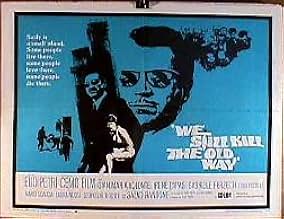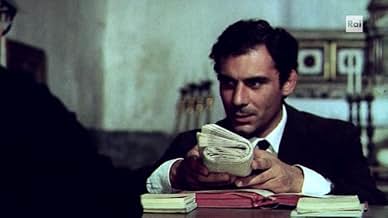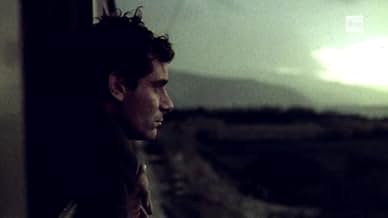IMDb RATING
7.0/10
2.1K
YOUR RATING
In Sicily, a leftist professor investigates the "honor killings" of two friends, uncovering a tangled web involving politicians, the Mafia, the Church, and the widow of one of the victims.In Sicily, a leftist professor investigates the "honor killings" of two friends, uncovering a tangled web involving politicians, the Mafia, the Church, and the widow of one of the victims.In Sicily, a leftist professor investigates the "honor killings" of two friends, uncovering a tangled web involving politicians, the Mafia, the Church, and the widow of one of the victims.
- Director
- Writers
- Stars
- Awards
- 6 wins & 2 nominations total
- Director
- Writers
- All cast & crew
- Production, box office & more at IMDbPro
Featured reviews
This marks the first collaboration between director Elio Petri, writer Ugo Pirro and actor Gian Maria Volonte which was to bear fruit in the extraordinary 'Indagine su un cittadino al di sopra di ogni sospetto' and is loosely adapted from the novel by Leonardo Scascia who was again to provide the source material for Rosi's stupendous 'Cadaveri Eccellenti'.
Scascia's novel was inspired by the assassination of a policeman by the Mafia and here Petri and his cinematographer Luigi Kuveiiller have created a striking contrast between the ravishing Sicilian scenery and the all-pervading corruption although there is perhaps a little too much use made of the 'zoom'.
Excellent script and taut editing with strong performances from Volonte, Gabriele Ferzetti, both of whom were awarded Silver Ribbons, the striking Irene Papas whose role does not really do justice to her talents and a marvellous cameo by Petri regular Salvo Randone as a blind oculist!
Petri's customary Left-leaning social criticism is in evidence here but what should have been a top class film is alas, for this viewer at any rate, weakened by imperfect post-synchronisation and some distinctly dodgy dubbing. The genius of Ennio Morricone is conspicuous by its absence here as the score by Luis Bacalov is intrusive, badly integrated and undermines rather than underlines the film's effectiveness.
Scascia's novel was inspired by the assassination of a policeman by the Mafia and here Petri and his cinematographer Luigi Kuveiiller have created a striking contrast between the ravishing Sicilian scenery and the all-pervading corruption although there is perhaps a little too much use made of the 'zoom'.
Excellent script and taut editing with strong performances from Volonte, Gabriele Ferzetti, both of whom were awarded Silver Ribbons, the striking Irene Papas whose role does not really do justice to her talents and a marvellous cameo by Petri regular Salvo Randone as a blind oculist!
Petri's customary Left-leaning social criticism is in evidence here but what should have been a top class film is alas, for this viewer at any rate, weakened by imperfect post-synchronisation and some distinctly dodgy dubbing. The genius of Ennio Morricone is conspicuous by its absence here as the score by Luis Bacalov is intrusive, badly integrated and undermines rather than underlines the film's effectiveness.
Although drawn from a powerful novel by Leonardo Sciascia, this results in an oversimplified, well-meaning social mystery set in 1965 Sicily, where two men are killed during a hunting party. A leftist professor (Gian Maria Volonté, a much better actor in the later Petri offering "Indagine su un cittadino al di sopra di ogni sospetto") decides to investigate the murders, only to find himself entangled in a spiderweb of corrupt politicians, "mafiosi" killers and sinister Church connections: the anonymous letters received by the victims - and, in due time, by the professor himself - were made with clippings from the Vatican newspaper "L'Osservatore Romano". There is also a fascinating dark lady character, a victim's widow, played by the splendid Irene Papas, whose black-stockinged legs wink through the whole film to the shy, undecided professor. When he resolves to take the woman, in a love scene near the end of the movie, it is unfortunately too late... The film can still be seen with some fun, but it's far from a serious rendition of the novel and it's not perhaps among the best Mafia movies made in Italy at the time. It's curious to note how so-called "spaghetti westerns", for instance, were often much more effective in describing corrupt politicians and Mafia-governed southern towns than their "mainstream" counterpart, like this typically engagé movie. I found also irritating the use of Cinemascope combined with low angles, continuous camera movements and extremely close shots, so that the narrative pace is fragmented and, more often than not, disturbed.
Paolo Laurana is a kind of leftist intellectual who chances to be intrigued by a mysterious double murder in the Sicily of mid Sixties. In his personal detection for murder's instigators, he will run into a plot in which both politicians and mafia racketeers are involved. So curiosity will become a very dangerous affair. Taken from a novel by Leonardo Sciascia (1921-1989), A ciascuno il suo (1967) is a film where high rank acting is at its top. Cast (Gianmaria Volonté, Irene Papas, Gabriele Ferzetti, Salvo Randone, Luigi Pistilli. Mario Scaccia, Leopoldo Trieste) is perfect and well-combined, direction (Elio Petri, 1929-1982) is powerful and impressive. If compared to the novel, Elio Petri's film (written with Ugo Pirro) may seem short of that illuministic pessimism that breathes through Sciascia's books, but Laurana's rationalistic search for truth retains that `bitter taste of intelligence' which is one of the major feature of Sciascia's characters. A key film to understand historical condition of Italy in the Sixties.
At the beginning of the movie a pharmacist receives an anonymous letter that threatens him of death. And the murder actually happens. Seems very simple but nothing is what it seems and the journey to the truth will be long and difficult. The book is excellent and the movie is at par with it and very faithful to the romance. Great direction. Incredible cast with Gabriele Ferzetti in his best interpretation together with the one in "C'era una volta il West" and Gianmaria Volonté simply beyond reach as always. Many other great actors. Yes I am an enthusiast 'cause there's not a word or a shot out of place in this movie and the plot is ingenious. Who is going to see this film for the first time will be taken away by the developments (the pace seems to be calm but looking in between the kinks you may realize that many things are going rapidly on). Trying to figure out what is the kernel of the happenings and the "reasons" for the murder is a very interesting exercise but it's highly unlikely for the spectator not to experience a big surprise at the end. In my opinion Elio Petri at his best (I mean at the same level of his other masterwork: La classe operaia va in Paradiso).
Gian Marie Volonte's got himself into some hot water this time! Doesn't he know that in Sicily, if someone gets murdered, you just keep your trap shut and let whoever the police randomly arrest go to jail?
Luigi Pistilli keeps getting letters telling him he's a dead man, and its making him a bit paranoid. Nevertheless, one morning he says goodbye to his wife, then his lover, and sets off with his friend to go hunting, only to find himself the prey. Two corpses later, we've got a bit Sicilian funeral to go to while the police chat about the people attending, including a well-respected lawyer (Gabriele Ferzetti) who's cousin (Irene Papas) was married to one of the victims, and Gian Marie Volonte, a professor friend of the two who starts poking in places that should not be poked.
Pistilli is generally thought to be the target as he was a bit of a fanny rat and some family members are arrested, but they are all illiterate so how could they cobble together those threatening letters. Volonte also finds that the words in the letter were from a Vatican-based newspaper, which leads him to the priesthood. Oh, and a lot of people are related in this film, so one of the priests is the uncle of Papas and Ferzetti.
It's a formula you'll see a lot of in these films, so it's just as well the lead actors are good! Volonte has the hots for the widow Papas and has to basically restrain himself every times he meets her, while Papas kind of has the hots for him too, leading to all kinds of awkward moments. Volonte is very good at the bookish professor who is just too smart and curious for his own good, while Papas just smoulders as the widow.
It looks absolutely scorching hot in Sicily in this film, and just like Damiano Damiani's Day of the Owl, the island itself is a character, with all the strange culture that lives on its land.
The only let down of the film is that the plot is a bit predictable, but it's by no means a bad film.
Luigi Pistilli keeps getting letters telling him he's a dead man, and its making him a bit paranoid. Nevertheless, one morning he says goodbye to his wife, then his lover, and sets off with his friend to go hunting, only to find himself the prey. Two corpses later, we've got a bit Sicilian funeral to go to while the police chat about the people attending, including a well-respected lawyer (Gabriele Ferzetti) who's cousin (Irene Papas) was married to one of the victims, and Gian Marie Volonte, a professor friend of the two who starts poking in places that should not be poked.
Pistilli is generally thought to be the target as he was a bit of a fanny rat and some family members are arrested, but they are all illiterate so how could they cobble together those threatening letters. Volonte also finds that the words in the letter were from a Vatican-based newspaper, which leads him to the priesthood. Oh, and a lot of people are related in this film, so one of the priests is the uncle of Papas and Ferzetti.
It's a formula you'll see a lot of in these films, so it's just as well the lead actors are good! Volonte has the hots for the widow Papas and has to basically restrain himself every times he meets her, while Papas kind of has the hots for him too, leading to all kinds of awkward moments. Volonte is very good at the bookish professor who is just too smart and curious for his own good, while Papas just smoulders as the widow.
It looks absolutely scorching hot in Sicily in this film, and just like Damiano Damiani's Day of the Owl, the island itself is a character, with all the strange culture that lives on its land.
The only let down of the film is that the plot is a bit predictable, but it's by no means a bad film.
Did you know
- TriviaFilm debut and only film performance of Anna Rivero.
- ConnectionsEdited into Lo schermo a tre punte (1995)
- SoundtracksPour rêve l'hiver
("A Dream for Winter") (uncredited)
Lyrics by Arthur Rimbaud
Music by Luis Bacalov
Sung by Léo Ferré
- How long is We Still Kill the Old Way?Powered by Alexa
Details
- Runtime
- 1h 39m(99 min)
- Sound mix
- Aspect ratio
- 1.85 : 1
Contribute to this page
Suggest an edit or add missing content





























